In post-disaster scenarios, coping with loss and grief involves recognizing your emotional reactions, like shock, sadness, or numbness, which are natural. Express your feelings openly to process and find support from friends, family, or community groups. Practice stress management techniques like deep breathing, journaling, or mindfulness. Consider seeking professional help and participating in rituals or memorials to honor those you’ve lost. Continuing this guide will help you discover more ways to find resilience and healing.
Key Takeaways
- Recognize and accept emotional reactions like shock, fear, and sadness as normal parts of grief after a disaster.
- Share feelings openly with support networks to validate emotions and facilitate healing processes.
- Connect with community resources, support groups, and mental health professionals for practical and emotional assistance.
- Engage in rituals, memorials, or cultural practices to process grief and honor loved ones.
- Practice stress management techniques such as mindfulness, journaling, and physical activity to foster resilience during recovery.
Understanding the Emotional Impact of Disasters
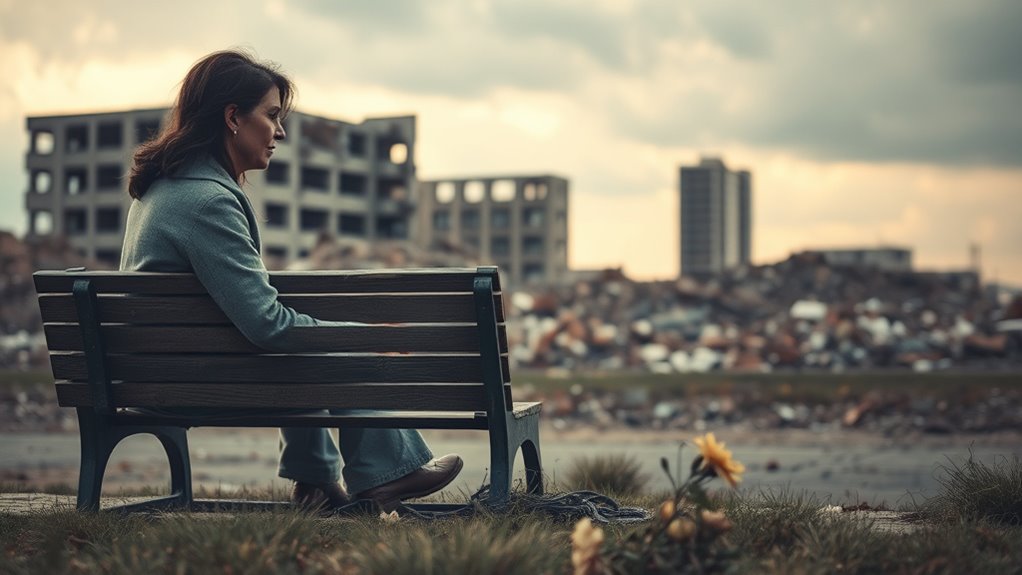
Disasters often strike suddenly, leaving behind a whirlwind of emotions that can be overwhelming. You might feel shock, fear, or sadness, and these reactions are completely normal. Developing emotional resilience helps you cope with the intense feelings that follow a disaster. Trauma awareness is essential; understanding that your emotional responses are valid allows you to process grief healthily. Recognizing these emotions early can prevent them from becoming overwhelming or leading to long-term mental health challenges. Understanding the emotional impact of disasters includes acknowledging that grief can manifest physically as well as emotionally, which underscores the importance of addressing both aspects in recovery. Additionally, practicing self-compassion can foster a more nurturing environment for healing. Remember, your feelings are part of the healing process, and seeking support when needed is a sign of strength. Building emotional resilience doesn’t mean ignoring pain but learning to manage it effectively, helping you regain a sense of stability amid chaos. Exploring emotional resilience strategies can further empower you to navigate your feelings during difficult times, especially by understanding how personal traits can influence recovery. Being aware of narcissistic behaviors in yourself or others can also help identify unhealthy coping mechanisms that may hinder emotional healing.
Recognizing Common Reactions to Loss

When facing loss after a disaster, it’s common to experience a wide range of emotional reactions. You might feel overwhelmed by emotional shock, which can leave you feeling numb or disoriented. During this time, denial stages often occur, making it difficult to accept what has happened. You may tell yourself that the loss isn’t real or that it will somehow resolve itself. These reactions are natural as your mind tries to protect you from intense pain. Recognizing these responses helps you understand that what you’re experiencing is normal. While emotional shock and denial are temporary, they serve as initial steps in processing grief. Understanding the importance of emotional resilience can aid in coping with these feelings. Developing water efficiency awareness can be beneficial in managing resources as you recover. Being aware of financial security measures, such as safeguarding important documents and understanding your insurance coverage, is also crucial during this time. Creating a supportive environment by reaching out to friends, family, or mental health professionals can provide additional comfort and assistance as you navigate your recovery. Accepting these reactions is essential for moving forward and beginning to cope with your loss.
The Importance of Expressing Grief
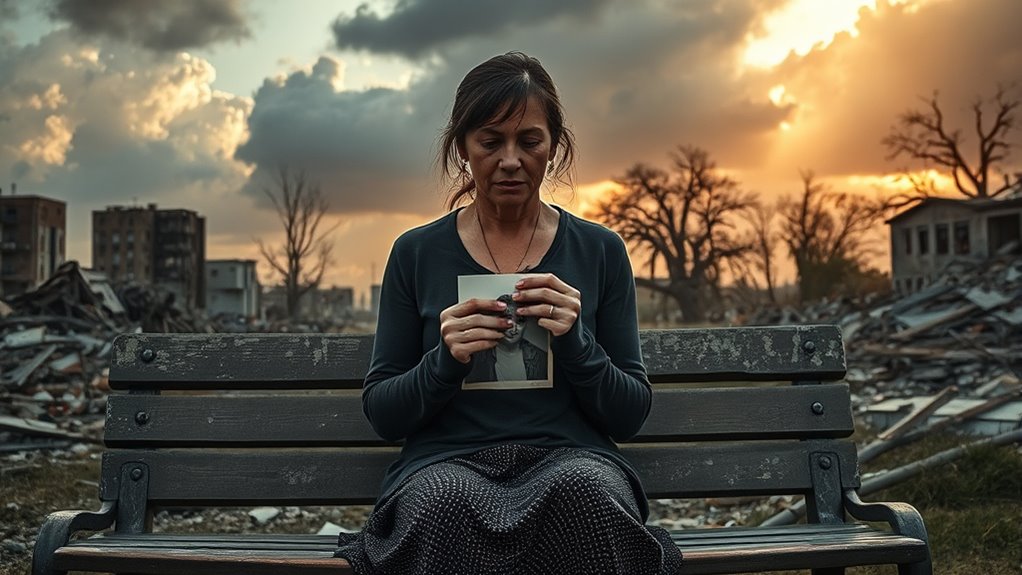
Sharing your feelings helps validate what you’re going through and reminds you that your emotions are normal. It also promotes healing by releasing built-up pain and frustration. When you express grief, you strengthen your support network, making it easier to find comfort and understanding. Engaging with inspirational quotes can provide additional solace and perspective during difficult times. Recognizing retail hours in your emotional processing can help organize your feelings and develop effective coping strategies. Incorporating mindful decluttering strategies into your routine can foster a sense of control and clarity, aiding in emotional recovery.
Validates Emotional Experience
Expressing your grief is a crucial step in validating your emotional experience after a loss. When you openly share your feelings, you give yourself emotional validation, acknowledging the depth of your pain. Grief acknowledgment helps you recognize that your emotions are valid and natural, which is essential for processing loss. By expressing your feelings, you prevent them from building up or becoming suppressed, allowing you to confront your emotions honestly. This act affirms that your experience is real and deserving of attention. Remember, your feelings are a natural response to loss, and accepting them without judgment is essential. Validating your emotional experience through expression encourages self-compassion and creates a foundation for healing.
Facilitates Healing Process
Expressing grief plays a pivotal role in the healing process because it helps you process and release intense emotions. When you openly share your feelings, you build emotional resilience, making it easier to cope with ongoing challenges. Culinaria De Gustibus Bistro offers a comforting environment where shared stories and communal dining can facilitate emotional expression during difficult times. Cultural traditions often provide meaningful outlets for grief, such as rituals, ceremonies, or communal gatherings, which validate your experience and foster connection. These practices create safe spaces to express sorrow and honor your loved ones, reinforcing your sense of identity and belonging. Incorporating raw food ingredients into comforting meals can also serve as a healing ritual, providing nourishment and a sense of connection. Engaging in cultural expressions can deepen your understanding of your feelings and promote recovery. By embracing these cultural expressions, you allow yourself to heal gradually and authentically. Recognizing the importance of emotional expression can deepen your understanding of your feelings and promote recovery. Ultimately, expressing grief not only alleviates emotional burden but also nurtures resilience, helping you move forward with a deeper understanding of your feelings and a stronger capacity to cope.
Strengthens Support Networks
When you openly communicate your feelings of grief, you invite others to understand and support your emotional needs. Sharing your emotions fosters community bonding, creating a stronger support network during difficult times. Expressing grief encourages others to do the same, helping everyone feel less isolated. This openness can lead to resilience training within your community, where collective strength is built through shared experiences. By talking about your loss, you help break down barriers and promote empathy among friends, family, and neighbors. As support networks grow stronger, you’ll find it easier to navigate the healing process together. Remember, vulnerability isn’t a sign of weakness but an essential step in building resilience and fostering a compassionate environment for everyone affected by the disaster. Recognizing the importance of support networks can significantly enhance collective recovery efforts.
Building a Support System During Difficult Times
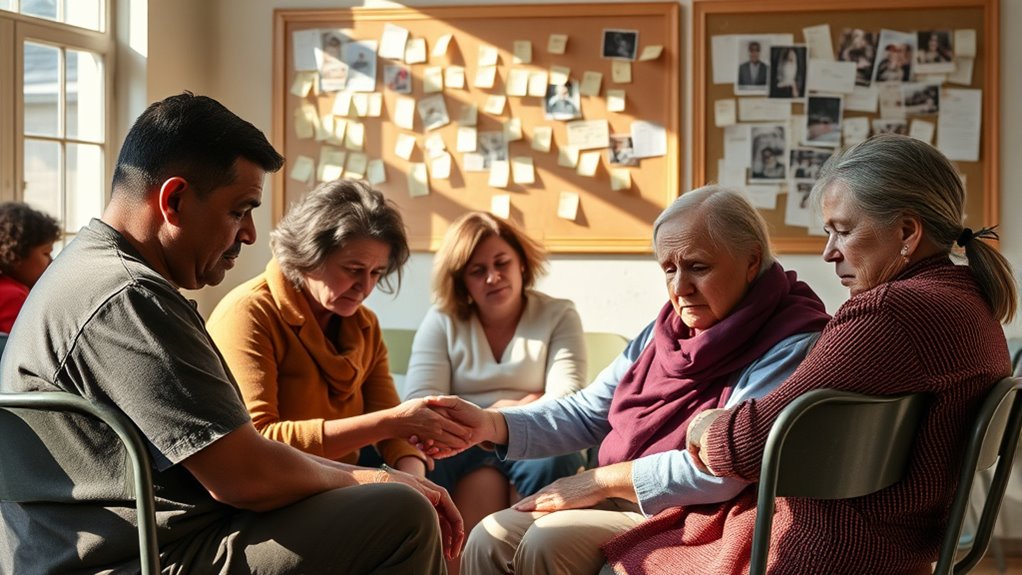
Reaching out to others can provide comfort and practical help during tough times. Connecting with friends, family, or support groups makes you feel less alone. Don’t hesitate to explore community resources that are available to assist you through this challenging period. Participating in support groups can also offer a sense of community and shared understanding during difficult times. Remember, emotional support from others can be a vital part of healing and resilience. Additionally, understanding prophetic dreams might offer spiritual comfort or insights during periods of grief, helping to foster hope and guidance in uncertain moments. Some individuals find that engaging in self-care practices, such as gentle exercise or mindfulness, can further support emotional well-being during recovery. Keeping an eye on market trends and insights can sometimes provide distraction and a sense of normalcy amidst emotional upheaval.
Connecting With Others
During times of loss and grief, building a strong support system can provide essential comfort and stability. Connecting with others through community bonding helps you realize you’re not alone in your feelings. Sharing experiences with those who understand your situation fosters empathy and trust, making it easier to process your emotions. Reaching out to friends, family, or support groups creates a network that offers practical help and emotional reassurance. These connections remind you that others have faced similar struggles, which can be comforting and empowering. By actively engaging with your community, you build resilience and find strength in shared experiences. Remember, opening up and connecting with others is a crucial step toward healing in the aftermath of a disaster.
Seeking Community Resources
How can you access the community resources available to support you in difficult times? Start by visiting local community centers, which often offer programs designed for grief support and emotional recovery. Many centers provide workshops, counseling referrals, and information about ongoing support groups. Support groups are especially helpful because they connect you with others facing similar struggles, making you feel less isolated. Check online directories, community bulletin boards, or ask local organizations about available services. Don’t hesitate to reach out—these resources are there to help you navigate your grief. Engaging with community centers and joining support groups can give you a sense of belonging and strength, helping you build a support system during tough times.
Strategies for Managing Stress and Anxiety
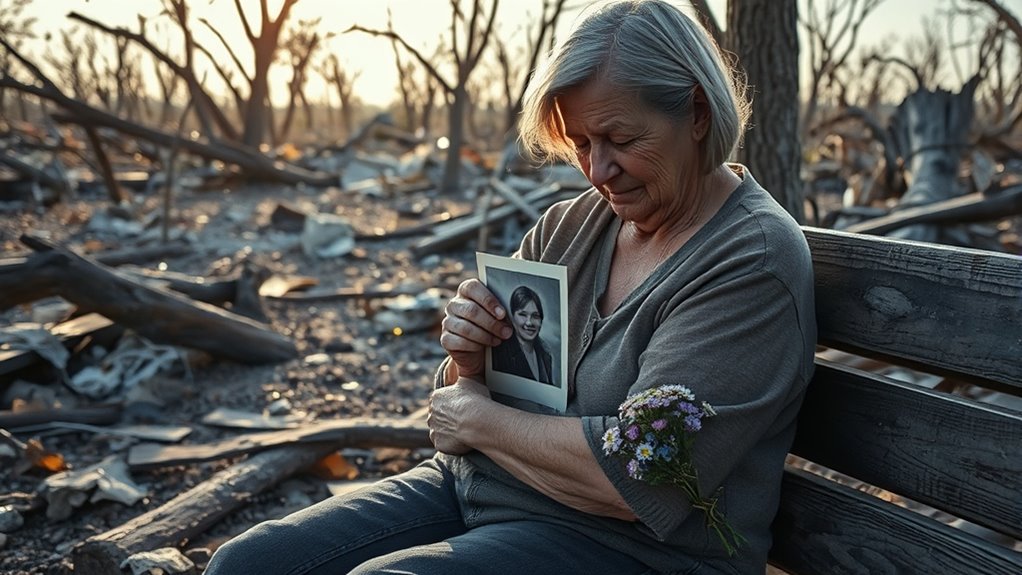
When faced with the chaos of a disaster, managing stress and anxiety becomes essential for your well-being. You can do this by practicing mindfulness exercises, which help ground your thoughts and reduce feelings of panic. Journaling techniques also allow you to process emotions and gain perspective. To make it easier, consider this simple approach:
| Technique | How It Helps | Tips |
|---|---|---|
| Mindfulness exercises | Calm your mind and stay present | Focus on your breath |
| Journaling techniques | Release emotions and reflect | Write daily, honestly |
| Deep breathing | Reduce immediate stress | Breathe slowly, deeply |
| Physical activity | Boost mood and reduce tension | Walk or stretch regularly |
Incorporate these strategies into your routine to better manage stress and maintain resilience.
The Role of Professional Help and Counseling

Managing stress and anxiety on your own is important, but sometimes professional support offers the guidance and tools you need to process grief effectively. Counseling approaches, such as cognitive-behavioral therapy or grief counseling, can help you navigate complex emotions and develop healthy coping strategies. Therapists use various therapeutic techniques to address trauma, restore emotional stability, and foster resilience. Engaging with a mental health professional provides a safe space to express feelings, gain perspective, and learn skills tailored to your situation. Remember, seeking help isn’t a sign of weakness but a proactive step toward healing. By working with trained counselors, you can better understand your grief, process loss, and gradually rebuild a sense of hope and stability after a disaster.
Incorporating Rituals and Memorials Into Healing

Incorporating rituals and memorials into your healing process can provide a meaningful way to honor those you’ve lost and make sense of your grief. Memorial ceremonies offer a space to reflect, share memories, and acknowledge your loss with others who understand your pain. Ritual practices, such as lighting candles, planting trees, or creating memory albums, help you process emotions and create a personal connection to your loved ones. These acts serve as tangible expressions of remembrance, fostering acceptance and healing. By engaging in these ceremonies and rituals, you actively participate in your grieving journey, transforming pain into a tribute that celebrates life and legacy. Incorporating these meaningful acts can gradually help you find peace amid the chaos of loss.
Self-Care Practices for Emotional Resilience
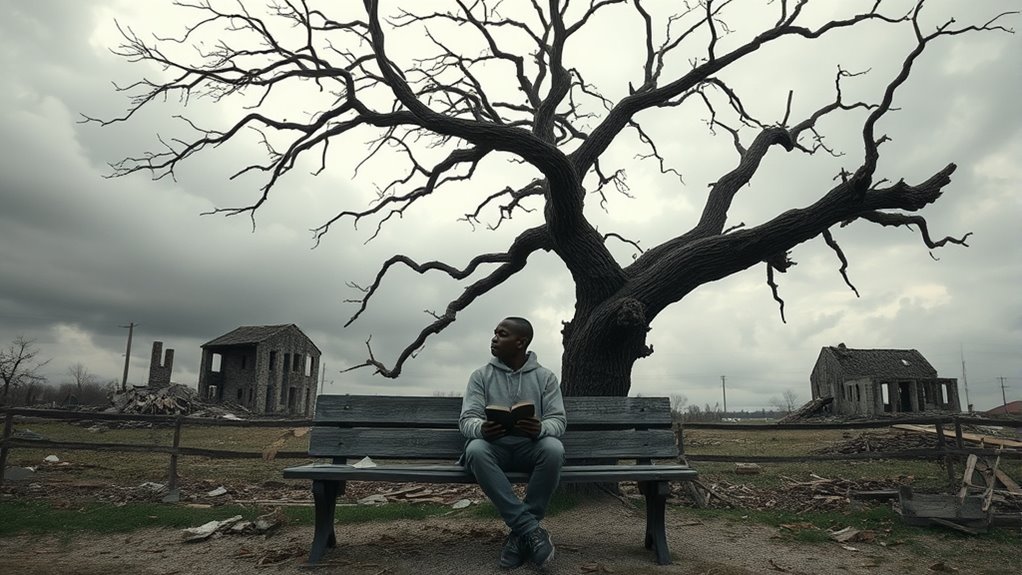
Have you considered how simple self-care practices can strengthen your emotional resilience during difficult times? Engaging in mindfulness meditation helps ground you in the present moment, reducing anxiety and fostering calmness. Regularly practicing mindfulness allows you to process emotions without judgment, making it easier to cope with grief. Journaling exercises are another powerful tool; writing about your feelings can clarify thoughts and release emotional tension. Set aside a few minutes each day to reflect and put your experiences into words. These practices not only provide immediate relief but also build long-term resilience. Prioritizing self-care helps you stay connected with your emotions while developing the strength to navigate grief and loss more effectively.
Rebuilding Hope and Moving Forward
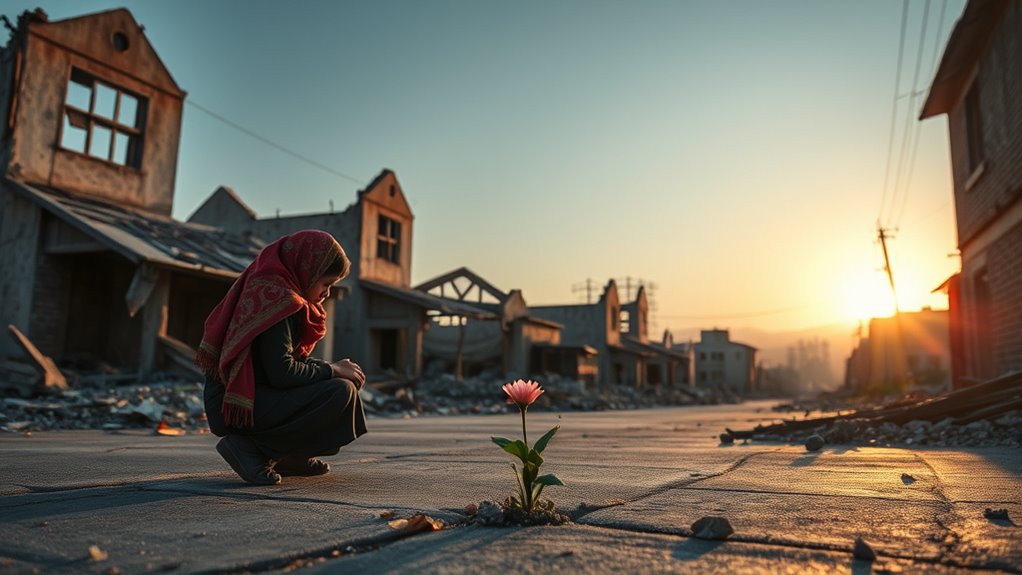
After experiencing loss and devastation, rebuilding hope becomes a vital step toward healing. Hope renewal fuels your motivation to face challenges and creates a sense of purpose for future rebuilding. To foster this, consider these actions:
- Recognize small victories to build confidence and demonstrate progress.
- Connect with community members to share experiences and collective resilience.
- Set realistic goals that focus on recovery and long-term growth.
Frequently Asked Questions
How Can Children Cope With Grief After a Disaster?
You can help children cope with grief by fostering their resilience and providing consistent emotional support. Encourage open conversations, allowing them to express their feelings freely. Offer reassurance and patience as they process their emotions. Engage in activities that promote normalcy and comfort. By strengthening their resilience and being a steady source of emotional support, you help children navigate their grief and gradually rebuild a sense of safety and hope.
What Cultural Practices Aid Grieving in Different Communities?
You’ll find that cultural practices like funeral rites and mourning rituals play a essential role in helping communities grieve. These traditions offer structured ways to express sorrow, honor the deceased, and foster support among members. Participating in these customs provides emotional relief and a sense of connection. By engaging in specific rituals, communities create a shared space for mourning, aiding the healing process and reinforcing cultural identity during difficult times.
How Do Financial Losses Affect Emotional Recovery?
Financial losses can markedly impact your emotional recovery by shaking your sense of stability. When money is tight, your mental health strategies might feel overwhelmed, making it harder to cope. Building economic resilience helps you regain control and confidence, which supports emotional healing. You should acknowledge your feelings, seek support, and develop practical plans to rebuild, knowing that financial recovery is a key part of your overall resilience.
When Is It Appropriate to Seek Professional Help?
You should seek professional help when your emotional resilience feels overwhelmed or when mental health awareness tells you you’re struggling to cope. If feelings of sadness, anxiety, or hopelessness persist beyond a few weeks, reaching out to a counselor or therapist is beneficial. Professional support can guide you through complex emotions, helping you rebuild resilience and maintain mental well-being during difficult times. Don’t hesitate to seek help when needed.
How Can Communities Foster Collective Healing?
Imagine a community coming together like a sturdy, woven tapestry, each thread strengthening the whole. You can foster collective healing by promoting community resilience and creating spaces for social support. Organize gatherings, share stories, and offer assistance to build trust and connection. When people unite with compassion and purpose, the community becomes a resilient fabric, helping everyone heal and grow stronger through shared hope and support.
Conclusion
Remember, healing takes time, and it’s okay to lean on others as you navigate this gentle journey. Embrace your feelings like guiding stars, leading you toward brighter days ahead. With patience and compassion, you’ll find new roots to grow and fresh hopes to nurture. Trust in your resilience, and know that even after a storm, the sky will clear, revealing a horizon full of promise and renewal.










